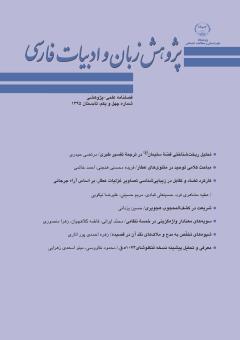مباحث کلامی توحید در مثنویهای عطار
محورهای موضوعی : Research in Iranian classical literatureفریده محسنی هنجنی 1 , احمد خاتمی 2
1 - دکتری رشته زبان و ادبیات فارسی، دانشگاه آزاد اسلامی واحد علوم و تحقیقات تهران
2 - استاد گروه زبان و ادبیات فارسی، دانشگاه شهید بهشتی
کلید واژه: شعر فارسی عطار عرفان علم کلام توحید,
چکیده مقاله :
ادبیات عرفانی همواره با رمز و راز همراه بوده است؛ درک مفاهیم، تعابیر، اصطلاحات و مضامین مندرج در شعر و نثر عرفانی از جمله اصطلاحات و مضامین کلامی که با نمادها و تمثیلهای خاص آمیخته شده، هیچ گاه به سادگی ممکن نبوده است. آثار ارکان ادب عرفانی در عین سادگی سؤالات عمیقی را در ذهن میآفریند که پاسخ به آنها نیاز به درک درست دیدگاههای عرفانی، مذهبی و کلامی مؤلفان دارد. عطار از جمله شعرای عارفی است که در تمامی آثار خود بسیاری از دیدگاههای اعتقادی و دینی خود را با ذوق عارفانه آمیخته است. این مقاله با روشی توصیفی- تحلیلی و با این فرض که اندیشههای عرفانی عطار آمیخته با اندیشههای کلامی اوست سعی دارد تأثیر مذاهب کلامی مختلف را بر مبانی فکری و عرفانی آثار عطار در بحث توحید بر پایه چهار مثنوی مشهور او بررسی کند. نتایج حاصل از این پژوهش حکایت از آن دارد که نفوذ مباحث کلامی درآثار بررسی شده به حدی است که بررسی آثارعطار بدون آگاهی از دیدگاههای کلامی او ناتمام خواهد بود؛ هرچند اصرار بر انتساب عطار به یکی از مذاهب کلامی نیزراه به جایی نمیبرد.
Mystical literature has always been accompanied by secrets and mysteries; and understanding the concepts, interpretations, terms and themes mentioned in mystical poems and proses such as theological themes has never been easy since they are mixed with special symbols and allegories. The elements of mystical literature, though not that complicated, bring up deep questions in mind, for which finding the answers requires true understanding of mystical, religious and theological insights of the authors. Attar is one of those mystic poets who has incorporated his beliefs and religious attitudes with a mystical virtue in all his works. Using a descriptive-analytical method, assuming that Attar’s mystical thoughts are incorporated with his theological thoughts, this paper tries to investigate the effects of different theological schools on the intellectual and mystic basis of monotheism (Tawhid) theme in Attar’s works with respect to his well-known four Masnavi books. The results show that the influence of theological issues on these works is too much that any account of Attar’s works without learning about his theological insights would be incomplete. However, it would be useless to insist on assigning him to one specific theological school.
قرآن کریم.
تفتازانی، سعدالدین (1409) شرح المقاصد، قم، الشریف الرضی.
حلی، حسن بن یوسف (1376) کشف المراد، ترجمه و شرح به قلم ابوالحسن شعرانی، چاپ هشتم، تهران، اسلامیه.
سبحانی، جعفر (1412) الالهیات علی هدی الکتاب و السنه و العقل، قم، المرکزالعالمین للدراسات الاسلامیه.
السیوطی، جلال¬الدین(1373) الجامع الصغیر فی احادیث البشیر النذیر، مصر، قاهره.
شریف، میان محمد (1389) تاریخ فلسفه در اسلام، چاپ دوم، تهران، مرکز نشر دانشگاهی.
شهرستانی، محمد بن عبدالکریم(1364) الملل و النحل، چاپ سوم، قم، الشریف الرضی.
طبرسی، احمدبنعلی(1381) الاحتجاج، ترجمه جعفری، تهران، اسلامیه.
مشکوه¬الدینی، تهران، موسسه انتشارات و چاپ دانشگاه تهران.
عطار، فریدالدین (1392 الف) اسرارنامه، مقدمه، تصحیح و تعلیقات محمدرضا شفیعی کدکنی، چاپ ششم (ویرایش سوم)، تهران، سخن.
------------- (1392 ب) الهی¬نامه، مقدمه، تصحیح وتعلیقات محمدرضا شفیعی کدکنی، چاپ ششم (ویرایش سوم)، تهران، سخن.
------------- (1386) مصیبت¬نامه، مقدمه، تصحیح و تعلیقات محمدرضا شفیعی کدکنی، (ویرایش دوم)، تهران، سخن.
------------- (1384) منطق¬الطیر، مقدمه، تصحیح و تعلیقات محمدرضا شفیعی کدکنی، (ویرایش دوم)، تهران، سخن.
عین¬القضات (1389) تمهیدات، با مقدمه و تصحیح و تحشیه و تعلیق عفیف عسیران، تهران، منوچهری.
غزالی، محمد (1351) احیاء علوم¬الدین، ترجمه مویدالدین محمد خوارزمی، به کوشش حسین خدیوجم، تهران، انتشارات علمی و فرهنگی.
فیاض لاهیجی، عبدالرزاق (1383) گوهرمراد، مقدمه از زین¬الدین قربانی، تهران، سایه.
المناوی، محمد عبدالرئوف (1938) فیض القدیر (شرح الجامع الصغیر)، قاهره، مکتبه مصطفی محمد.
المنطقی السجستانی، ابوسلیمان (1974) صوان الحکمه، و ثلاث رسائل، حققه و قدّم له الدکتور عبدالرحمن بدوی، تهران، بنیاد فرهنگ ایران.
میبدی، رشیدالدین (1344) کشفالاسرار و عدهالابرار، به سعی و اهتمام علیاصغر حکمت، تهران، ابنسینا.


